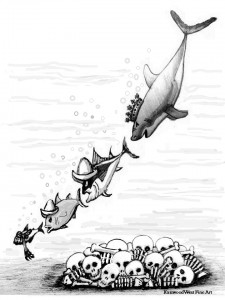What Balboa Really Discovered
Posted in General, On This Day on September 25th, 2009 by Eugene Finerman – 5 CommentsSeptember 25, 1513: Balboa Discovers the Pacific Ocean
 The geezers among us (40 years old or worse) will remember being taught that Vasco Nunez de Balboa (1474-1519) discovered the Pacific Ocean. We now realize that reflects a slight European bias. The Chinese may have noticed a mass of water to their east. The Japanese could hardly ignore it; in fact, they appreciated the ocean’s isolating charm. (It kept out Mongol cavalry.) Even if we only count Europeans, then Marco Polo discovered the Pacific Ocean.
The geezers among us (40 years old or worse) will remember being taught that Vasco Nunez de Balboa (1474-1519) discovered the Pacific Ocean. We now realize that reflects a slight European bias. The Chinese may have noticed a mass of water to their east. The Japanese could hardly ignore it; in fact, they appreciated the ocean’s isolating charm. (It kept out Mongol cavalry.) Even if we only count Europeans, then Marco Polo discovered the Pacific Ocean.
So today’s school textbooks–at least the ones that don’t attribute everything to Jesus–now credit Balboa as being the first European to see the Pacific Ocean from the American shore. It happened this day in 1513. At the time, he was touring the area we know as Panama, introducing himself to the local tribes and charging them all their gold and gems for the privilege. For a conquistador, Balboa was considered quite humane. He rarely attacked without warning, and he did not regard the natives’ attempt at self-defense as a personal affront or as a justification for genocide. Once he had thrashed any resistance, he was willing let the remnants of the tribe become his “allies”–a better social standing than slaves but not quite as dignified as toadies.
While making new allies, Balboa heard reports of a great sea to the south and west. His interest was not merely academic; the coastal tribes were said to be rich in pearls. A rumor is as good as invitation, and what more did a conquistador need? With 190 Spaniards and 1000 native levies, Balboa proceeded on his quest. The distance from the Spanish base on the Caribbean to the Pacific would not seem very great; but that narrow isthmus had hostile tribes, dense jungles and steep mountains. It was nearly four weeks before Balboa came within sight of the southern sea, and it would be another four days before he was standing in its waters.
Balboa claimed the ocean on behalf of Spain; but it would be at least three centuries before the Chinese and Japanese learned that they were trespassing. However, the conquistador was far less audacious in coming up with a name for Spain’s new waterworld. When in doubt, a prudent Spaniard would think of something impeccably Catholic. As far as the Inquisition was concerned, the whole world should be named for the Virgin Mother. A clever courtier might have gratified the Church and the King: the San Ferdinand Ocean? But, at his moment in history, all Balboa could think of was “Mar del Sur”: the South Sea. (Seven years later, Ferdinand Magellan offered a Pacific alternative.)
Balboa then returned to the Caribbean and the far greater dangers of Spanish politics. The conquistadors were not a corps of civil servants or even army regulars; they were an assortment of cutthroats and sociopaths tolerated by the Crown so long as they remembered that the King received 20 percent of the loot. The quickest way for a conquistador’s promotion was to oust his superior. That had been Balboa’s path. A younger son of a minor noble and a failed pig farmer fleeing his debts, Balboa joined an expedition whose commander intended to overthrow a provincial governor. Balboa instead ousted him, organizing a mutiny and then arresting the commander for embezzlement against the Crown. Embezzlement was an useful charge because it was usually true, and the King was always ready to believe it. So the arrested officer was off to Spain, and now Balboa was the commander. As for the expedition’s original mission, Balboa soon was governor of Panama too. Of course, to justify his usurpations, he had to send ample loot to Spain.
King Ferdinand appreciated a lucrative rogue like Balboa; but the Crown still had to protect the dignity of its governors. So Ferdinand came up with a compromise, appointing a new governor but elevating Balboa to be Admiral of the South Sea; the two were expected to cooperate and rule together. The new governor was an elderly aristocrat; how long do you think that he would last against the younger adventurer? Wrong! It was Balboa who proved the guileless dupe. The wily courtier bided his time and encouraged the marriage of his daughter to Balboa. Over the next few years, Balboa launched expeditions in the South Sea searching for a fabulously rich empire. However, none of the ships evidently reached Peru; and the Admiral’s repeated failures were accumulating as evidence to justify his ouster. Unfortunately, the governor also wanted Balboa out of the family. In 1519, Balboa was arrested for treason and beheaded. So it seems that aristocrats can be cutthroats, too. After all, that is how they first got their titles.
As for that fabulously rich empire to the south of Panama, the rumors persisted. And one of Balboa’s soldiers was an illiterate ruffian named Francisco Pizarro.